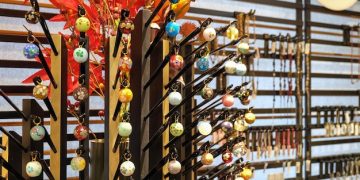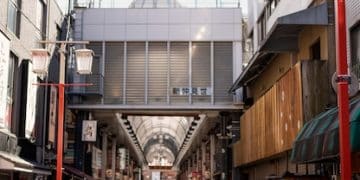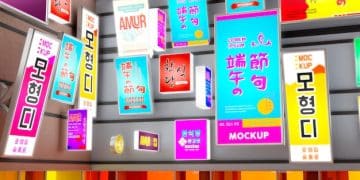The Best Time to Shop in Japan: 2025 Sales & Discounts for US Shoppers
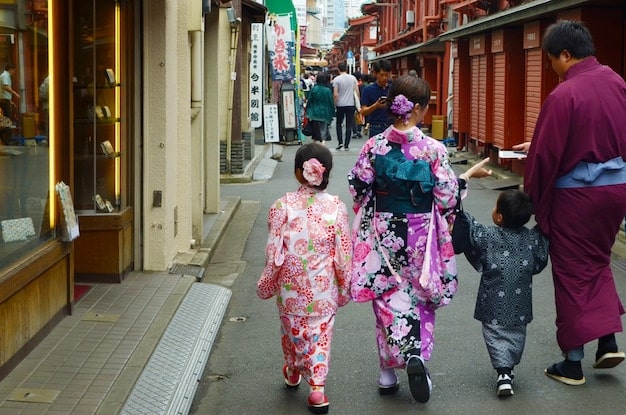
Planning a shopping trip to Japan in 2025? Knowing the best time to shop, including seasonal sales and holiday discounts, can help US visitors maximize their budgets and find unique Japanese products.
Dreaming of snagging unique finds and amazing deals in Japan? Knowing the best time to shop in Japan: Seasonal sales and holiday discounts for US visitors in 2025 can make all the difference. Let’s dive into the calendar and uncover the prime shopping seasons to help you score the best bargains.
Timing Your Trip: Understanding Japan’s Sales Seasons
Japan’s retail landscape is punctuated by distinct sales seasons that offer significant discounts. Understanding these periods can help US shoppers plan their trips to coincide with the best opportunities to save.
Winter Sales (December – January)
The winter sales, especially those around New Year’s, are a major event. Many stores offer ‘fukubukuro’ or lucky bags containing a surprise assortment of items at a steep discount.
Summer Sales (June – August)
The summer sales provide another window for bargains. Retailers clear out their inventories to make way for fall collections, offering discounts on everything from clothing to electronics.
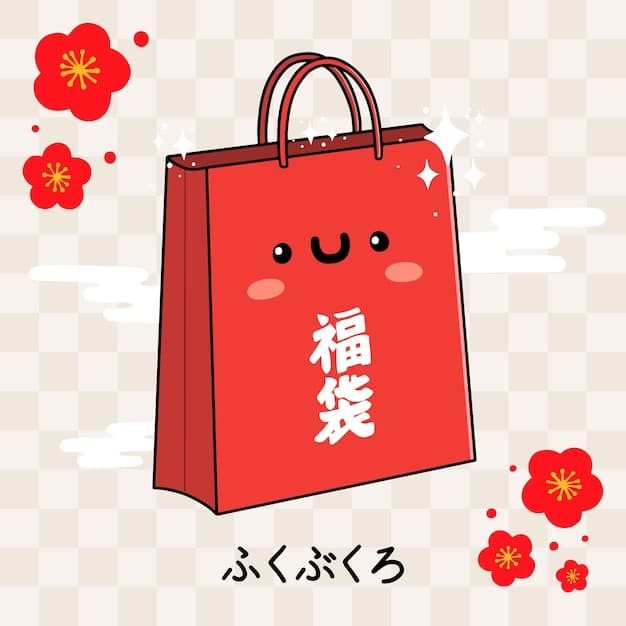
End-of-Season Sales
Throughout the year, keep an eye out for end-of-season sales that typically occur as retailers transition between collections. These sales can offer substantial savings.
- New Year’s Sales: Offers the deepest discounts and lucky bags.
- Summer Sales: Ideal for seasonal clothing and summer goods.
- End-of-Season Sales: Unpredictable but can provide great deals on current trends.
By understanding the timing of these sales seasons, visitors from the US can strategically plan their trip to maximize savings and enjoy the best shopping experience Japan has to offer.
Holiday Discounts: Capitalizing on Japanese Festivities
Japanese holidays are often accompanied by special promotions and discounts in retail stores. Aligning your shopping days with these celebrations can lead to better deals and a more festive experience.
Golden Week (Late April – Early May)
Golden Week is a series of holidays condensed into a single week, making it a popular time for travel and shopping. Retailers often roll out special promotions to attract customers during this peak period.
Obon Festival (Mid-August)
The Obon Festival is a Buddhist tradition honoring ancestors. While it’s primarily a time for family reunions, many stores offer special sales in recognition of the holiday.
Christmas and New Year’s
While Christmas isn’t a national holiday in Japan, it’s widely celebrated with festive decorations and sales. New Year’s, on the other hand, is a major holiday with extended store closures followed by significant sales events.
Shopping during Japanese holidays adds cultural immersion to your retail therapy. Look for holiday-themed merchandise and unique offerings tailored to the season.
Navigating Japanese Department Stores: A US Shopper’s Guide
Japanese department stores, known as ‘depato,’ offer a curated selection of high-quality goods and exceptional service. Understanding their layout and customs can enhance your shopping experience.
Department Store Layout
Japanese department stores typically have a basement level dedicated to food, while upper floors feature fashion, household goods, and luxury items. The top floor often houses restaurants and event spaces.
Tax-Free Shopping
Many department stores offer tax-free shopping for tourists. To qualify, you’ll need to present your passport and make a minimum purchase amount. Look for signs indicating ‘Tax-Free’ services.
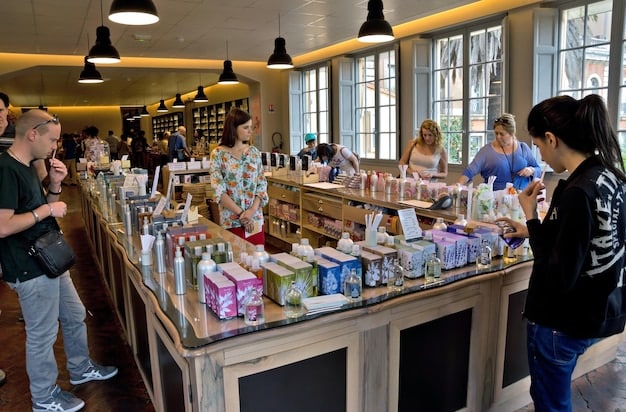
Customer Service
Japanese department stores are renowned for their exceptional customer service. Don’t hesitate to ask for assistance, as staff are typically attentive and helpful.
- Basement Level: Discover food halls with local delicacies and gourmet treats.
- Upper Floors: Explore fashion, homewares, and luxury brands.
- Tax-Free Counters: Take advantage of tax exemptions for tourists.
Navigating Japanese department stores is an experience in itself. The combination of quality products, attentive service, and shopper-friendly policies makes it a must-visit for US shoppers.
Hidden Gems: Exploring Local Markets and Specialty Shops
Beyond department stores, Japan’s local markets and specialty shops offer a more intimate and unique shopping experience. Here’s how to discover these retail treasures.
Local Markets
Local markets, such as Nishiki Market in Kyoto or Ameya Yokocho in Tokyo, are vibrant hubs of commerce. These markets feature food stalls, craft vendors, and local artisans.
Specialty Shops
Specialty shops cater to niche interests, from anime and manga to traditional crafts and tea. These shops offer a curated selection of unique and hard-to-find items.
Vintage and Secondhand Stores
Exploring vintage and secondhand stores can uncover unique fashion finds and retro treasures. Japan has a thriving vintage scene, offering well-preserved clothing and accessories.
Exploring local markets and specialty shops takes you off the beaten path and introduces you to the authentic side of Japanese commerce. These hidden gems are perfect for finding unique souvenirs and experiencing local culture.
Budgeting and Payment Tips: Managing Your Money in Japan
Effectively managing your money is crucial for a successful shopping spree in Japan. Here are some essential budgeting and payment tips for US visitors.
Cash vs. Credit Cards
While credit cards are widely accepted in department stores and larger retailers, cash is still king in many smaller shops and local markets. It’s advisable to carry a mix of both.
Currency Exchange
Exchanging currency before your trip or upon arrival at the airport can provide better exchange rates than using airport ATMs. Look for reputable currency exchange services.
Tax Refund Information
Understanding the tax refund policies is essential for maximizing your savings. Keep your receipts and follow the procedures for claiming your tax refund at designated counters.
- Carry Cash: Essential for smaller shops and local markets.
- Use Credit Cards: Accepted in department stores and larger retailers.
- Review Tax Refund Policies: Maximize your savings with tax-free shopping.
With these budgeting and payment tips, you’ll be well-equipped to manage your finances and make the most of your shopping adventure in Japan.
Cultural Etiquette: Shopping Customs to Know in Japan
Understanding Japanese shopping customs can enhance your shopping experience and show respect for local traditions. Here are some key etiquette tips.
Gift-Giving Culture
Gift-giving is an integral part of Japanese culture. When purchasing gifts, consider the recipient’s status and preferences. Gift wrapping is typically elaborate and signifies respect.
Handling Money
When paying for goods, avoid handing money directly to the cashier. Instead, place it on the designated tray. This gesture is considered more polite and hygienic.
Respectful Behavior
Maintain a respectful demeanor in stores. Avoid loud conversations, and be mindful of other shoppers. Patience and politeness are highly valued.
Adhering to Japanese shopping etiquette demonstrates respect for local customs and enhances your interaction with retailers. A little knowledge of cultural norms goes a long way in creating a positive shopping experience.
| Key Point | Brief Description |
|---|---|
| 🛍️ Seasonal Sales | Winter (Dec-Jan) & Summer (Jun-Aug) offer major discounts. |
| 🎌 Holiday Sales | Golden Week & New Year’s feature special promotions. |
| 🏬 Department Stores | Offer tax-free shopping and exceptional customer service. |
| 💴 Payment Tips | Carry a mix of cash and credit cards for smooth transactions. |
Frequently Asked Questions
▼
‘Fukubukuro’ or lucky bags are sold during New Year’s sales. They contain a surprise assortment of items at a discounted price and can be found at most department stores.
▼
Present your passport at the tax-free counter in participating stores after making a purchase of a certain minimum amount. Follow their instructions to claim your refund.
▼
Credit cards are accepted in larger establishments like department stores and hotels, but smaller shops and local markets often prefer cash. Always carry some yen for smaller purchases.
▼
During Obon festivals, retail promotions offer discounts on a variety of items including traditional crafts, clothing, and seasonal products. It’s a good time to shop for souvenirs.
▼
For a one-week trip, budget around ¥70,000-¥100,000 per person, equivalent to about $500-$700 USD, to cover transportation, meals, and shopping in local markets and small shops.
Conclusion
Mastering the nuances of Japanese shopping seasons, holiday discounts, and cultural etiquette can greatly enhance the experience for US visitors in 2025. Plan strategically, budget effectively, and embrace the unique retail landscape of Japan for an unforgettable shopping adventure.

